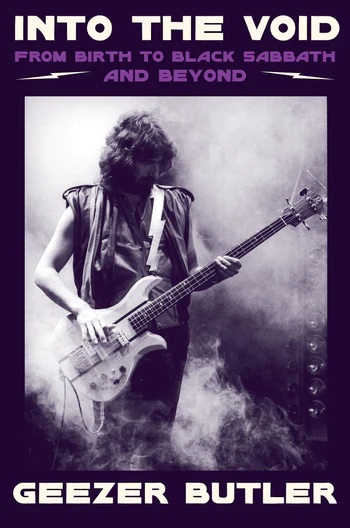We’ve heard from Ozzy Osbourne and Tony Iommi about their time in Black Sabbath and beyond. Now it’s time to get Geezer Butler’s take. The Black Sabbath bassist and lyricist may come across a nimble, steady figure, but don’t let his cool, lean disposition fool you. In his memoir, Into The Void: From Birth To Black Sabbath — And Beyond, Butler details his upbringing, goes deep into Black Sabbath’s origins, dispels many of the myths surrounding the band and their image, touches on their highs and lows, and offers an honest, sometimes brutal account of being an integral part of the band often called interchangeably the “Godfathers” and “Beatles” of heavy metal.
Like his bandmates, growing up in Birmingham for Terance “Geezer” Butler wasn’t easy. His Irish parents were practical and working-class. As the youngest of seven, the bassist’s journey to stardom was a stark departure from the norm. He almost became an accountant, but his love for art, literature and music lead to a life filled with once-in-a-lifetime experiences, along with ongoing financial struggles, even during Black Sabbath’s reign in the 1970s. He credits the rise of heavy metal in the 80s and Sabbath’s celebrated legacy in its wake to his raised status and financial well-being.
Butler doesn’t hold back when it comes to describing his bandmates and their quirks. Of course, Osbourne was as mad as can be in Sabbath’s formative years. Drummer Bill Ward had alcohol and hygiene issues, but he was always a good and reliable chap. Guitarist and de facto leader Iommi, a real prankster if your back is turned, remains the most central musical figure in Butler’s life. Not only did they each have a heavy stake in writing Black Sabbath’s songs (predominantly, Butler’s lyrics and Iommi’s riffs); they also stuck it out with Sabbath in all its forms the longest.
Even when Iommi started bringing in other players under the “Black Sabbath” name in the late 80s and early 90s, Butler was watching and in the loop. He also spent time with Osbourne in the 90s, recording and touring with the singer and his band, where he learned, among other sordid tidbits, that guitarist Zak Wylde is nearly as nuts as his boss.
The business difficulties that shrouded Sabbath are not that much different from other bands of the era. In this case, their involvement with music moguls like Don Arden and his daughter Sharon Osbourne, plus managers Jim Simpson and Patrick Meehan, lead to a lot backstabbing, tax and legal problems, misplaced funds, and later, “unsignable” contracts. This is really where Butler voices his grievances. Only his wife, Gloria, has earned the man’s trust, both personally and professionally.
Despite the obstacles, Butler comes across as extremely affable, content, well-balanced, and proud of his career. Outside of Sabbath, he’s lived a semi-normal existence with a wife and kids, in both Britain and the States. He indulged in alcohol and drugs, got in fights, and had a few run-ins with the authorities, but as the only band’s vegetarian, has emerged relatively unscathed from the perils of the rockstar lifestyle.
A constant highlight that pops up throughout is whenever he clarifies a Black Sabbath lyric, most of which were interpreted as dark, foreboding, and satanic. Legend has that “N.I.B.” is an acronym to “Nativity in Black,” which was later the title of a Black Sabbath tribute album. Butler says that the band called Bill Ward’s beard “Nib” and the song title was capitalized with periods for effect. It’s little bits of trivia like this that make the book a lot of fun to read, especially if you’re a Black Sabbath fan.
Into The Void: From Birth To Black Sabbath — And Beyond winds down with the end of Black Sabbath and Butler’s retirement. He parts ways from the music business with little regret or bitterness. He’s still in touch with his Sabbath bandmates. He was close with Ronnie James Dio, Sabbath’s second frontman, right up until the singer’s unfortunate passing from cancer in 2010. No bridges were burned in the writing of this book, though supposedly some things were left out to protect the guilty. Whether an “uncensored” version ever sees the light of day remains to be seen. In the meantime, this tomb from the “heart and soul” of Black Sabbath is a fascinating tale not to be missed.
~ Shawn Perry




















